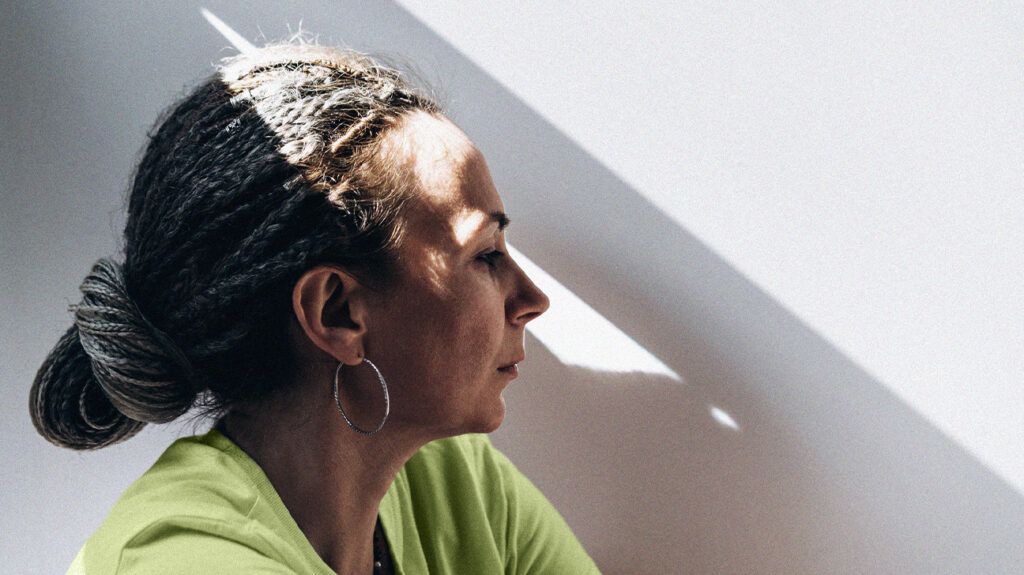A thyroid headache may feel like a dull, throbbing sensation. It may also cause a sharp pain. Managing thyroid headaches typically involves managing the thyroid disorder.
There is a possible association between thyroid disorders and headaches. A thyroid headache may feel similar to a tension headache, which may present as a dull, throbbing sensation on both sides of the head.
Certain thyroid conditions may cause migraine, which cause a sharper throbbing sensation in one region of the head and can also cause vomiting and visual disturbances.
Managing thyroid headaches often involves treating the thyroid condition through thyroid replacement therapy or thyroid removal, depending on whether hypothyroidism or hyperthyroidism is the root cause.
Taking over-the-counter (OTC) or prescription-strength pain relievers may provide immediate relief, as can lying in a dark, quiet room.
This article explains what a thyroid headache may feel like. It goes over the types of headaches and how to manage them.

A thyroid headache may feel like a dull pulsing or throbbing sensation on both sides of the head. It may occur at the base of the neck or in a higher region. This tension-type headache can last anywhere from 30 minutes to several days and may go away after resting or taking OTC pain relievers.
It
Some people experience nausea and vomiting with migraine. Migraine headaches are typically more painful than tension headaches and can last anywhere from 4–72 hours. They also present as a throbbing sensation and generally occur on one side of the head.
Headaches are commonly associated with hypothyroidism. An estimated 30% of people with hypothyroidism experience headaches they attribute to this condition.
Hypothyroidism occurs when the thyroid gland stops producing enough thyroid-stimulating hormone (TSH).
There are multiple root causes of hypothyroidism:
- Hashimoto’s disease, which is an autoimmune disorder and is the most common cause
- thyroiditis, which is inflammation of the thyroid
- congenital hypothyroidism, which is hypothyroidism that a person is born with
- surgical removal of all or part of the thyroid gland
- radiation on the thyroid to treat a condition such as Graves’ disease
- certain medications, such as antiepileptic drugs
- a pituitary disease, in rare cases
- not consuming enough iodine, in rare cases
Hyperthyroidism occurs when the thyroid gland produces too much TSH. Some
A thyroid storm is a life threatening event in which symptoms of hyperthyroidism suddenly worsen. It requires immediate medical attention.
Causes of hyperthyroidism
- Graves’ disease, which is an autoimmune disorder
- overactive thyroid nodules
- thyroiditis
- consuming too much iodine
- taking too much thyroid medication
- a noncancerous tumor on the pituitary gland
Headaches and thyroid disorders are comorbidities, which means they can occur together.
However, people who experience migraine may be at a higher risk of developing hypothyroidism. More research is needed on this relationship.
People who experience thyroid headaches can work with a healthcare professional to develop a treatment and management plan.
To address the pain and discomfort of a thyroid headache, a healthcare professional may suggest OTC pain relievers, or they may prescribe a stronger pain reliever.
A person should only use OTC medications as directed and recommended by a healthcare professional. Excessive or frequent use can lead to side effects, such as liver toxicity and rebound headaches.
Resting by lying down in a dark, quiet room may also help provide relief during a headache episode. Getting regular massages may also help relieve pain from tension headaches or migraine.
Addressing the root cause of headaches involves treating the thyroid condition. For hypothyroidism cases, this often involves hormone replacement therapy with levothyroxine sodium. Healthcare professionals use blood tests to determine how much TSH is present in the body, which affects the dosage.
The required dosage may change over time, depending on weight fluctuations and other conditions such as pregnancy. It is important to take levothyroxine as prescribed.
Hyperthyroidism requires different treatments depending on the cause. For example, treatment for Graves’ disease
However, removal of the thyroid may be necessary in some cases, which can be done through surgery or dissolving the gland with radioactive iodine therapy. After removal, the person will be treated for secondary hypothyroidism through levothyroxine.
The following are answers to some questions frequently asked about thyroid disorders and headaches.
What are the surprising signs of a thyroid issue?
Thyroid hormones have an effect on several systems in the body. Aside from headaches, thyroid issues can cause hair loss or changes in hair texture, tremors, body temperature dysregulation, appetite changes, and mood changes.
Can thyroid issues cause daily headaches?
People with hypothyroidism report experiencing regular headaches that they attribute to their condition. This can be a daily occurrence for some people. For others, it may only occur a few times a month.
Thyroid conditions may have a connection to tension headaches or migraine. They can present as a dull, throbbing sensation on both sides or a sharper throb on one side, often with vomiting and visual disturbances.
Management involves addressing the underlying thyroid issue through replacement therapy or removal, coupled with pain relievers and rest for immediate relief.
Research shows that hypothyroidism and hyperthyroidism have links with headaches.
To manage thyroid headaches, individuals should speak with a healthcare professional for pain relief options and to address the root cause through tailored approaches like hormone replacement therapy.
